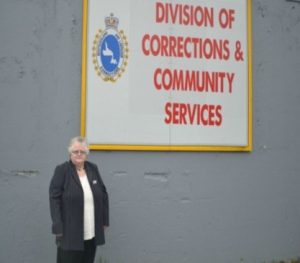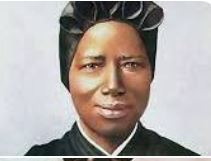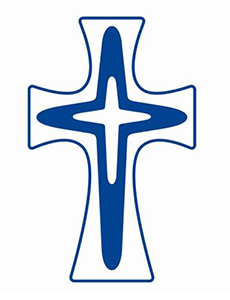Sister Margie Taylor relates a few of her recent experiences with some whom she has accompanied.
“Sister Margie, a woman’s got to do what a woman’s got to do to survive.” With these words, a woman described how she was involved in the sex trade industry in order to meet her basic needs. In 2001, I first became involved in a ministry as a prison chaplain for women. The crimes the women were charged with at that time involved shoplifting, theft, possession of drugs or driving without a license. But today the face of crime has changed and the challenges are monumental.
 Many of the people with whom I journey are marginalized by the stigma of mental illness. This may manifest itself as depression, bipolar disorder, schizophrenia, anxiety, or personality disorders. The stigma coupled with SHAME is cited as the number one reason why individuals do not seek help. In late April 2023, I journeyed with a woman whom I referred to as “the woman in the tent.” Amidst freezing cold temperatures, she chose to sleep in a small pup tent by our Basilica because she felt safe there. I kept showing up until I won her trust, learned her name and was able to see her move to better accommodations where she felt safe once more.
Many of the people with whom I journey are marginalized by the stigma of mental illness. This may manifest itself as depression, bipolar disorder, schizophrenia, anxiety, or personality disorders. The stigma coupled with SHAME is cited as the number one reason why individuals do not seek help. In late April 2023, I journeyed with a woman whom I referred to as “the woman in the tent.” Amidst freezing cold temperatures, she chose to sleep in a small pup tent by our Basilica because she felt safe there. I kept showing up until I won her trust, learned her name and was able to see her move to better accommodations where she felt safe once more.
One author in writing of our capital city refers to it as Rock, Paper, Sex. Rock as the name of our city, paper as money utilized in the sex trade industry and sex for the demand itself. Yes, today a woman’s got to do what a woman’s got to do to survive. The key is in asking ourselves: “How can we mind our mental health and address this issue so people can stand TALL because TALL is a TALL order?”
-Margie Taylor, rsm
La hermana Margie Taylor relata algunas de sus experiencias recientes con algunas de las personas a las que ha acompañado.
“Hermana Margie, una mujer tiene que hacer lo que tiene que hacer para sobrevivir”. Con estas palabras, una mujer describió cómo se había involucrado en la industria del comercio sexual para satisfacer sus necesidades básicas. En 2001, me involucré por primera vez en un ministerio como capellán de prisiones para mujeres. En aquella época, los delitos de los que se acusaba a las mujeres eran hurtos, robos, posesión de drogas o conducir sin carné. Pero hoy el rostro de la delincuencia ha cambiado y los retos son monumentales.
Muchas de las personas con las que viajo están marginadas por el estigma de la enfermedad mental. Esto puede manifestarse como depresión, trastorno bipolar, esquizofrenia, ansiedad o trastornos de la personalidad. El estigma, unido a la VERGÜENZA, se cita como la razón número uno por la que las personas no buscan ayuda. A finales de abril de 2023, viajé con una mujer a la que me refería como “la mujer de la tienda”. En medio de temperaturas gélidas, eligió dormir en una pequeña tienda de campaña junto a nuestra Basílica porque allí se sentía segura. Seguí apareciendo hasta que me gané su confianza, aprendí su nombre y conseguí que se mudara a un alojamiento mejor donde volviera a sentirse segura.
Un autor, al escribir sobre nuestra capital, se refiere a ella como Piedra, Papel, Sexo. Roca como nombre de nuestra ciudad, papel como dinero utilizado en la industria del comercio sexual y sexo por la propia demanda. Sí, hoy una mujer tiene que hacer lo que tiene que hacer para sobrevivir. La clave está en preguntarnos: “¿Cómo podemos cuidar nuestra salud mental y abordar este tema para que la gente pueda mantenerse en pie porque TALL es una orden TALL?”.
-Margie Taylor, rsm


 The Pope reminds us that God’s message is always one of freedom. He also cautions that the journey from slavery to freedom is not an abstract one. It requires us to open our eyes to the reality of our world.
The Pope reminds us that God’s message is always one of freedom. He also cautions that the journey from slavery to freedom is not an abstract one. It requires us to open our eyes to the reality of our world. Bahkita, who is also the patron saint of Sudan, her homeland, was kidnapped and sold into slavery at a very young age – a victim of human trafficking. Eventuaslly freed, she became a Canossian nun and was declared a Saint in 2000.
Bahkita, who is also the patron saint of Sudan, her homeland, was kidnapped and sold into slavery at a very young age – a victim of human trafficking. Eventuaslly freed, she became a Canossian nun and was declared a Saint in 2000. Sister Mary Teresa was professed in May of 1884 and in August of that same year she became part of the founding community of St. Bride’s Convent, Littledale. Her keen interest in the schools and her remarkable business aptitude prepared her well for the ministry ahead.
Sister Mary Teresa was professed in May of 1884 and in August of that same year she became part of the founding community of St. Bride’s Convent, Littledale. Her keen interest in the schools and her remarkable business aptitude prepared her well for the ministry ahead.